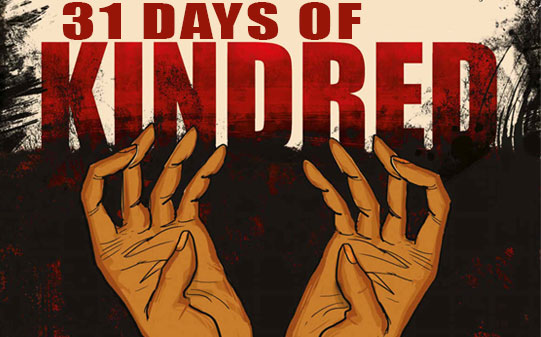The graphic novel adaptation of Octavia E. Butler’s Kindred that I wrote/lettered and John Jennings drew will be released by Abrams ComicArts on January 10, 2017 (available for pre-order now). In recognition of that momentous occasion, I’m writing 31 blog posts about the path from novel to graphic novel. This is 31 Days Of Kindred.
* * *
Day 15
“Like, Who The F*ck Are You?” (Part II)
Learn
* * *
As I’ve mentioned once or twice before, I’m a white dude. Which is mostly uninteresting, here in the white supremacist heteronormative patriarchy of ‘Murica, but is noteworthy in this instance since I’ve written an adaptation of one of the great works of literature written by an African-American woman specifically about America’s history of systematized racism built on the foundation of chattel slavery.
I have heard the argument that Kindred is a woman’s story, and should be adapted by a woman. Or it’s a story about black people, so it should’ve been adapted by a black writer. And, I mean, I believe there should be greater diversity of people creating comics. In fact, a lot of my work as a scholar and a curator has been specifically about highlighting the diversity there already is (especially in independent comics), and encouraging more people to celebrate and participate in growing that diversity. I don’t want to be part of the problem.
On the other hand, if my work is about anything, and if the place of my race and gender within that work is about anything, it’s resisting the idea that the lives of people of colors other than my own are somehow separate. Unattached. Because, to me, black history is white history. It’s important to say that black lives matter, because if you won’t recognize the humanity in others you debase your own. If I want my work in comics to stand for anything (beyond the basic craft goals of making good art, telling a good story), it’s to argue that we are connected. That it is possible to reach across social, cultural, racial, gender boundaries. Not just possible, but necessary, especially now as fascists try to turn the compound fractures in civil society into amputations.
I don’t mean to argue that me adapting a novel, or writing a comic, so bound up in race and gender issues is part of some kumbaya, let’s all hold hands and dance around a rainbow white neoliberal fantasy. There are very real reasons for rage in the world, and there are very ugly realities about the failures of our social structures, and I have no good answers for the questions these raise. But I feel like Kindred at least recognizes these problems. It doesn’t shirk the complexity in favor of platitudes. It rejects ridiculous ahistorical notions of superiority based on melanin content, configuration of sex organs, religious faith, or who you love. And I hope that my work does the same thing.
I talked about empathy in yesterday’s post, and I’ve always hoped my work encouraged empathy in an honest way. And I feel strongly that this sort of honest empathy, that I’ve searched for in my own work, is the same sort of intricate and nuanced political discourse that powers Octavia Butler’s writing.
I’m sometimes asked some version of the question, “Why are you the white guy who does Black Comix?” And I always stumble for an answer. Often, people assume it’s owing to my long friendship and creative partnership with John. And look, of course working for over a decade with the preeminent visual cultural scholar/artist of race and comics is going to have an impact. On what I read, on what I know. I’m blessed to have him as a partner, which is not some shit I ever say, being not particularly religious.
But John has nothing to do with it. By which I mean, I’ve in this since I was little. I grew up in relatively integrated spaces (in terms of black/white people. I don’t want to perpetuate the erasure of other race/gender/sexuality/national identities in overly simplistic, binary views of race, because that’s some bullshit too. Just to clarify).
Anyway, yeah, integrated grade on through high school. The first friends I remember making at school were black. One of those friends babysat me during some summers, when my mom had to work. So we hung out and played in a mostly black suburban neighborhood.
And I grew up around racism too. Family and friends. I remember this kid Mike, from fifth grade, once told me excitedly how he had met a grand wizard, and he did not play Dungeons & Dragons. I remember hearing put upon heavy metal white boys grumbling racist shit when the gang banger dude who bullied them (and me) was on the other side of the room, and couldn’t hear. I remember telling an older relative I liked rap music, and having them ask, perfectly innocently, didn’t the other kids at school call me a “<n-word> lover.”
And, being shy, taking things in, I learned an important lesson. This is what I know: This is how it is, with race in America. It does no good to pretend like it’s any other way. Sometimes even the people you love most in the world can be total assholes.
So, like Octavia Butler advised, I don’t write what I know. I do what she said, “…write what you’re interested in and research it. I wrote to get away from what I knew.”
I know how racism is from a white perspective. I do my best to understand how racism is from a black perspective. I don’t know what it’s like to be a woman, or gay, or anything. But I do the best I can to understand.
I write to get away from what I know. To find what I need to learn.

